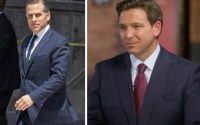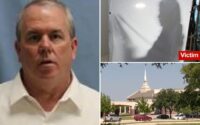Secret Service agent who was with JFK when he was assassinated raises new questions about ‘magic bullet’ theory
A former Secret Service agent who was with President John F. Kennedy when he was assassinated in Dallas nearly 60 years ago has raised new questions about the infamous “magic bullet” theory and the possibility multiple shooters involved.
Paul Landis, now 88, was a young agent tasked with protecting first lady Jackie Kennedy as the president’s motorcade paraded through the city in 1963.
He recalls hearing the gunshot ring out in Dealy Plaza while he was walking just feet away from the president in 1963, he told The New York Times. He then heard an additional two shots and saw Kennedy keeled over in the back of the open limousine.
Landis said he had to duck down to avoid being splattered by brains.
From there, Landis’ account differs from the government’s official findings: In the ensuing chaos, he claims he picked up a bullet that was lodged in the back seat of the car where Kennedy had been sitting and placed it on the president’s hospital stretcher for investigators.

The 6.5 mm bullet, which had long been thought to have been found on the stretcher of Texas Gov.John Connally after it fell from a wound in his thigh.
Dubbed “the magic bullet,” The Warren Commission concluded that the shot, fired by lone gunman Lee Harvey Oswald, had incredibly passed through Kennedy’s throat from the rear, then hit Connally’s right shoulder, then somehow also wounded his back, chest, wrist and thigh.
The report found that one of the shots missed the motorcade, another was the “magic bullet,” and the final shot fatally struck Kennedy in the head.
Landis placed the bullet on Kennedy’s stretcher at the hospital, but now believes at some point the bullet shuffled from the president’s to the governor’s stretchers while they were pushed together, he told The Times.
The Warren Commission ruled out the bullet coming from the president’s stretcher.

“There was nobody there to secure the scene, and that was a big, big bother to me,” Landis said. “All the agents that were there were focused on the president.”
“This was all going on so quickly,” he continued, “And I was just afraid that — it was a piece of evidence, that I realized right away. Very important. And I didn’t want it to disappear or get lost. So it was, ‘Paul, you’ve got to make a decision,’ and I grabbed it.’”
Landis, who was never interviewed by the Warren Commission, believes that the bullet hit Kennedy but was undercharged and did not penetrate deeply into the president’s body and popped out before he was removed from the vehicle.
He told The Times he always had believed that Oswald was the lone gunman, but six decades later, he questions that conclusion.
“At this point, I’m beginning to doubt myself,” he said. “Now I begin to wonder.”

The bullet, found fully intact, was positively matched to Oswald’s Mannlicher-Carcano through ballistics analysis, The Warren Commission said in its report.
The aging former agent made the bombshell revelations in his upcoming book “The Final Witness,” which will be published by Chicago Review Press on Oct. 10.
James Robenalt, an Ohio-based lawyer and author of several books of history, has intensely researched the assassination and helped Landis work out his memories of that day. He believes Landis’ book will raise new questions about Kennedy’s death.
“If what he says is true, which I tend to believe, it is likely to reopen the question of a second shooter, if not even more,” Robenalt told The Times. “If the bullet we know as the magic or pristine bullet stopped in President Kennedy’s back, it means that the central thesis of the Warren Report, the single-bullet theory, is wrong.”
Which, he added, could mean that Connally was shot by a separate bullet and not by Oswald, whom he believes could not have reloaded fast enough.
Speculation about multiple shooters has been a popular theory since the immediate moments after Kennedy’s assassination.
“Others will have to analyze the evidence in full to see where it now leads,” Robenalt told Vanity Fair.


